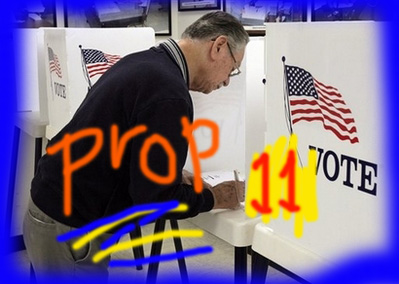
I asked the members of my USC Newswriting class to each write about one of the propositions. And, as I mentioned above, I’ll be posting many of them in the next few days.
This report, by smart USC Student Holly Villamagna, will give you the rundown on Prop. 11.
(By the way, after researching the matter, Holly recommends a NO vote.)
*******************************************************************************************************************
Prop 11 highlights partisan bickering
Proponents of Proposition 11 say it would give the people of California more control over their government, but many are wondering if it’s just another political power play.
The proposition would strip the state legislature of its power to draw legislative districts and give the job to a panel of 14 citizens instead. But the California Democratic Party says Republicans are using the bill to gain more seats in the legislature.
Redistricting is known for creating conflicts of interest. Politicians try to draw district lines so an area is overwhelmingly in favor of one political party. As a result, the candidates elected in primaries tend to follow the party line and centrist politicians are rarely able to break through.
Gov. Arnold Schwarzenegger has emerged as one of Proposition 11’s strongest supporters. In September, Schwarzenegger signed the state budget a record-breaking 85 days late. Soon after, he said Proposition 11 could prevent the type of partisan gridlock that made budget negotiations so difficult.
“This is a fixed system,” Schwarzenegger said, “a system that rewards legislators for rigid partisanship, and a system that punishes legislators for wanting to come in the middle and to go for compromise.”
Members of the state Democratic Party have said that Republicans support the bill because it could break up strongly Democratic districts and give them more seats in the government. Democrats, who have controlled the state legislature and senate since 1970, would be in control of redrawing the districts after the 2010 census.
Other opponents have argued that a group of citizens – the proposition says committees would be made up of five Democrats, five Republicans, and four independents – would be just as prone to inter-party bickering.
“If you want to see the same sort of gridlock with redistricting that we’ve seen in the budget, then Prop. 11 is your answer,” said No on Proposition 11 spokesman Paul Hefner.
Congressional districts are not included in the bill because the authors of the proposition were trying to avoid a well-funded opposition campaign by House Speaker Nancy Pelosi (D-San Francisco), the Los Angeles Times reported.
Districts are redrawn once every 10 years.

I’ve seen redistricting plans opposed by Democrats that they support in other states where it helps them. I wonder if your smart student would argue this the same way if the names of the parties were reversed?
Do you support gerrymandering?
Marc Cooper is for Prop. 11. You’re featuring a position against it. That leaves one really confused. Is there an option to copy Obama and just vote “present?”
Here’s what Marc said:
Woody, I didn’t say—one way or the other–how I stood on Prop 11. I’ll give endorsments and recommendations on Monday. This is meant to be informative. Particularly on a few of the props, like this one, where there’s a case to be made for both sides.
(On a few, I will likely hector, like on Props 2 and 6 and 8.)